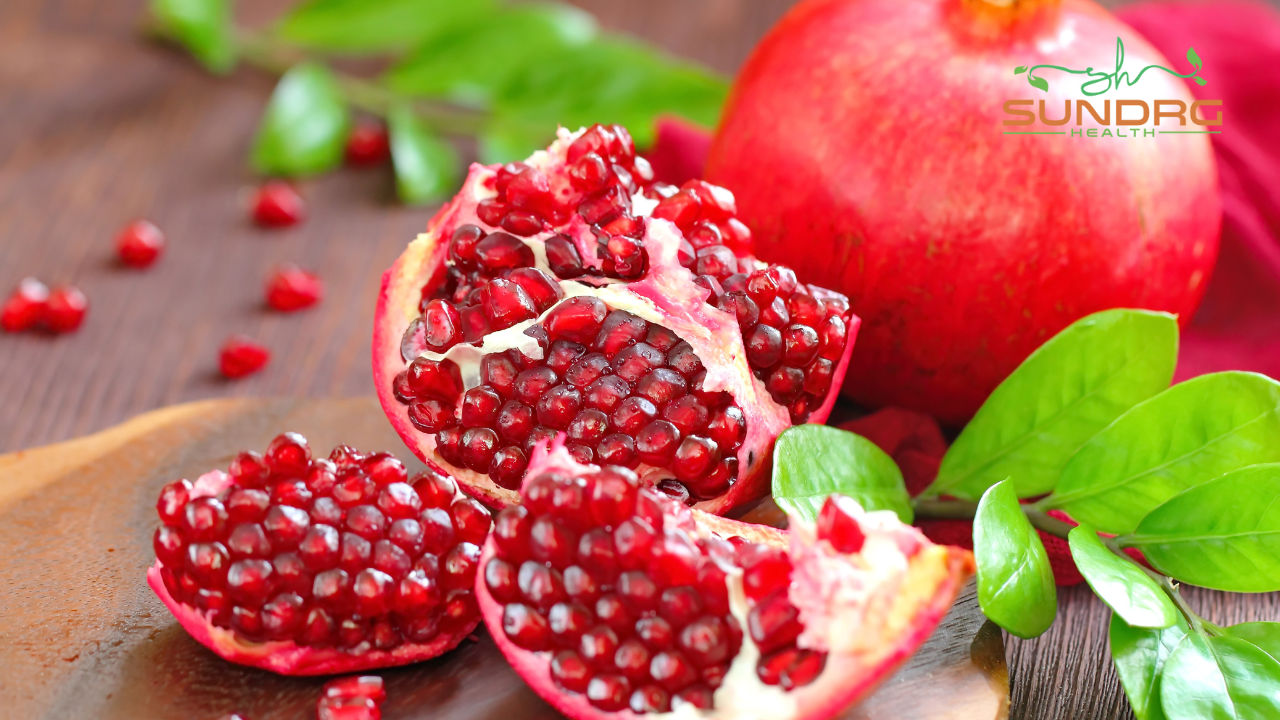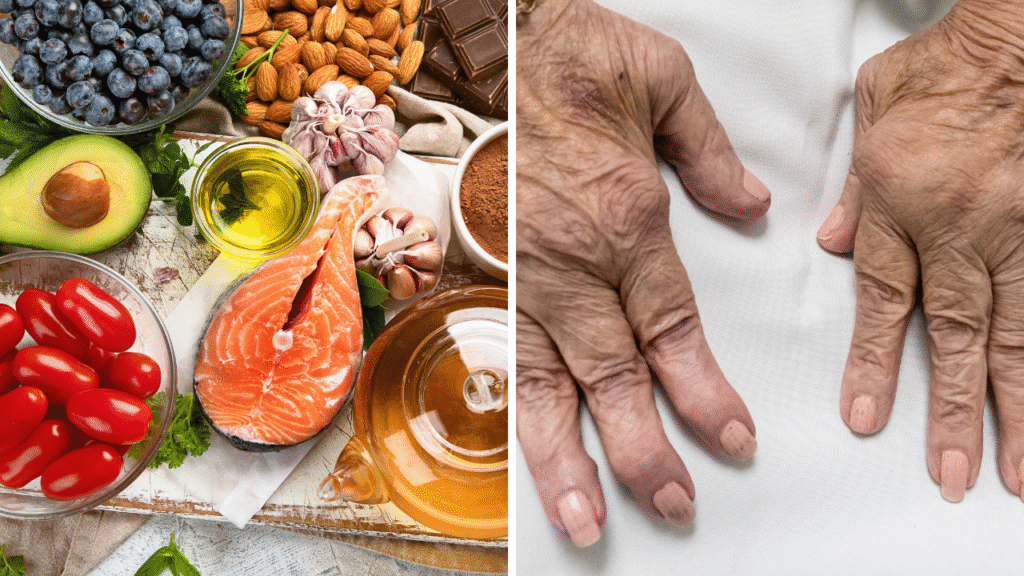Pomegranates are nutrient-dense fruits with low calories and fat, high fiber, vitamins, and minerals. They provide antioxidants, heart and urinary health, exercise endurance, and more. Pomegranates are spherical red fruits with white inside flesh and crisp arils. They have been enjoyed for their health advantages since antiquity. Modern research indicates that pomegranate antioxidants can protect the heart and may have anti-inflammatory and anticancer characteristics that are useful in cancer treatment and prevention. Pomegranates are grown in California and require high temperatures for growth and maturity.
Pomegranate Nutrition
Fresh pomegranates are nutritious, low in calories and fat, but high in fiber, vitamins, and minerals. One serving contains:
- 72 calories.
- 2.35 grams of protein.
- 1.6 grams of fat.
- 26 grams of carbohydrates.
- 5.5 grams of fiber.
- 20 grams of sugar.
An 8-ounce serving of pomegranate juice contains:
- 135 calories.
- 1 gram of protein.
- 0 grams of fat.
- 34 grams of fiber.
- 30 grams of sugar.
- 10 grams of sodium.
Here are 14 Health Benefits of Pomegranates.
1. Rich in antioxidants
Pomegranates are well-known for their high antioxidant and polyphenolic content, which includes punicalagin, anthocyanins, and hydrolyzable tannins. These molecules are essential in shielding the body’s cells against free radical damage, which has been related to various chronic conditions. Pomegranates are an excellent method to add these antioxidants into your diet, supporting general health and lowering disease risk. 2
2. It may help keep inflammation at bay.
Chronic inflammation has been related to a variety of health issues, including heart disease, type 2 diabetes, and cancer. Pomegranates are thought to have qualities that can help avoid inflammation associated with several chronic illnesses, owing to the presence of punicalagins, which are antioxidant and anti-inflammatory.
While further research is necessary, current studies suggest that consuming pomegranate juice can reduce specific markers of inflammation. In summary, although additional research is required, pomegranates contain compounds that may aid in preventing chronic inflammation associated with disease. 3
3. May offer heart health benefits
Pomegranates are rich in polyphenolic compounds that can improve heart health. Drinking pomegranate juice can reduce chest pain in people with heart disease and protect specific biomarkers. Pomegranate juice contains antioxidants like punicalagin and ellagitannins, which prevent artery thickening and cholesterol accumulation. Additionally, it is rich in anthocyanins and anthoxanthins, which support heart health. Clinical trials have shown that pomegranate extract supplements can have positive effects on individuals who are overweight or obese, leading to reductions in body weight, serum glucose, insulin, triglycerides, total cholesterol, LDL-to-HDL ratio, and inflammatory markers after 30 days of supplementation. 5
4. It may have anticancer properties.
Pomegranates, rich in antioxidants and flavonoids, have been found to have potential anticancer effects, including slowing tumor growth and reducing inflammation. Early studies suggest that pomegranates may prevent prostate, breast, lung, and colon cancers. In contrast, animal studies have shown that eating pomegranates may also prevent lung, skin, colon, and prostate tumor growth. However, further research is required to comprehend the potential benefits of pomegranate’s anticancer capabilities properly. 4
5. Support urinary health
Pomegranate extract has shown promising results in both test-tube and human studies for reducing the formation of kidney stones. A study from 2014 found that pomegranate extract inhibited the mechanism associated with stone formation in people with recurrent kidney stones. Furthermore, animal studies have shown that pomegranate extract can regulate the levels of oxalates, calcium, and phosphates in the blood, which are significant components of kidney stones. Some chemicals in pomegranate may help avoid kidney stones.
6. Support your digestive health.
Recent studies suggest that pomegranates may possess prebiotic properties. Prebiotics are compounds in food broken down by beneficial gut bacteria to provide essential nutrients. Nurturing your good gut bacteria can contribute to the overall well-being of your digestive system. The balance of microorganisms in your gut, known as the gut microbiome, is crucial in shielding you from chronic conditions like inflammatory bowel disease (IBD), type 2 diabetes, heart and cardiovascular disease, and colorectal cancer. Additionally, whole pomegranate seeds are fiber-rich, offering another means of promoting a healthy digestive system.
7. It may have antimicrobial properties.
Pomegranate compounds are effective in fighting harmful microorganisms. They can protect oral health by reducing the growth of germs that lead to bad breath and tooth decay. Pomegranates contain compounds that can combat potentially harmful bacteria, fungi, and yeasts, especially those in the mouth that contribute to oral health issues.
8. Prevent premature aging
Pomegranates are a natural anti-aging supplement that helps maintain skin suppleness, smoothness, and youthful appearance. They are rich in antioxidants that combat free radicals, which can damage collagen and healthy skin cells, leading to premature wrinkles, fine lines, and reduced skin elasticity. Pomegranates also stimulate collagen fiber production and inhibit enzymes that break down these fibers, preventing premature aging and preventing loose, sagging skin. Environmental pollutants, excessive sun exposure, poor diet, and dehydration can accelerate aging. (13)
Related: Top 17 Health Benefits of Dragon Fruit
9. Support your brain health.
“Pomegranates contain ellagitannins, a type of polyphenol that can help reduce inflammation in the body. Research suggests that ellagitannins may potentially protect the brain from conditions like Alzheimer’s disease and Parkinson’s disease by combating the harmful effects of free radicals and inflammation in the brain.”
10. Improve fertility
Pomegranates have been shown to provide potential benefits for people with polycystic ovarian syndrome (PCOS), which can affect fertility.
Studies have suggested that consuming pomegranate may help increase the motile sperm count in men who have low sperm counts or poor-quality sperm. (7) (8)
11. It may improve exercise endurance.
Pomegranates are rich in polyphenols, which have been found to increase exercise endurance potentially. According to a small study, pomegranate extract enhanced performance in trained cyclists by increasing time to exhaustion. Other research suggests that pomegranate supplements also benefit endurance and muscle recovery. However, studies using pomegranate juice have not shown the same benefits for muscle recovery, indicating the need for further research. Pomegranates contain compounds that promise to improve endurance and recovery, but more studies are required to understand their effects fully.
12. Support your joint health.
Studies across test tubes, animals, and humans have indicated that the antioxidants found in pomegranates could alleviate symptoms and reduce complications in individuals with rheumatoid arthritis. Additionally, research suggests that pomegranate may prevent osteoarthritis, the most prevalent type of arthritis associated with wear and tear.
13. Maintain oral health
Pomegranates are beneficial for maintaining oral health due to their antiplaque properties, which reduce plaque buildup. Plaque is a sticky film formed by oral bacteria overgrowth, damaging dental and gingival tissue. If left untreated, it can lead to periodontal issues like tooth decay, periodontitis, gingivitis, and denture stomatitis. You can include pomegranates in oral hygiene routines using toothpaste or mouthwashes containing pomegranate juice or extracts. In one study, rinsing the mouth with pomegranate juice has been shown to reduce plaque formation by 32%. (12)
14. Help manage diabetes
Pomegranate juice has been shown to help with insulin resistance, a condition seen in type 2 diabetes. Consuming whole fruit for fiber is recommended to avoid blood sugar spikes and excessive calorie consumption. Pomegranate juice is richer in antioxidants than seeds and contains rutin, a unique flavonoid that does not trigger blood sugar rises. Fresh pomegranate juice was reported in a study to reduce melatonin, boost insulin levels, and improve insulin resistance in persons with high fasting blood sugar levels. Taking small amounts every day can contribute to health benefits, such as a 175 lb man taking 120 ml (½ cup) of juice daily. Drinking pomegranate juice in the morning may be advantageous because it lowers melatonin, which prepares the body for sleep. (10)(11)(11)
Related: Health Benefits of Avocado
How to Include Pomegranates in the Diet
Looking for ways to incorporate pomegranates into your meals? Here are some ideas to consider:
1. Add pomegranate seeds to your yogurt and granola for a delicious breakfast parfait or a refreshing dessert.
2. Combine bananas and yogurt with pomegranate juice to create a nutritious smoothie packed with antioxidants, perfect for a delicious and fulfilling snack.
3. Include the seeds in a quinoa salad, combined with various fresh fruits and vegetables, to create a wholesome and tasty choice for lunch.
4. Give your dinner salad a tangy twist by incorporating pomegranate seeds.
5. Sprinkle some on your pizza or pasta to add a delightful crunchy touch.
6. Pomegranate juice, rice vinegar, oil, garlic, and white sugar can create a tasty homemade salad dressing.
Pomegranate Side Effects
Pomegranates are generally safe to eat, but they can cause allergic reactions in some people. Be alert for symptoms like hives or difficulty breathing if you have plant allergies. Since pomegranates are high in sugar, individuals with diabetes should consume them in moderation. Additionally, if you have kidney disease, be mindful of the high potassium content in pomegranates. Pomegranate may interact with certain medications, so consult your doctor if you take ACE inhibitors, high cholesterol drugs like Crestor, or blood thinners such as warfarin.
Conclusion:
Pomegranates contain antioxidants, fiber, and various essential vitamins and minerals. They have been linked to potential benefits such as cancer protection, improved exercise endurance, and antimicrobial properties. While more human research is needed to understand these benefits fully, it is clear that pomegranates are a delicious and nutritious addition to any diet.





